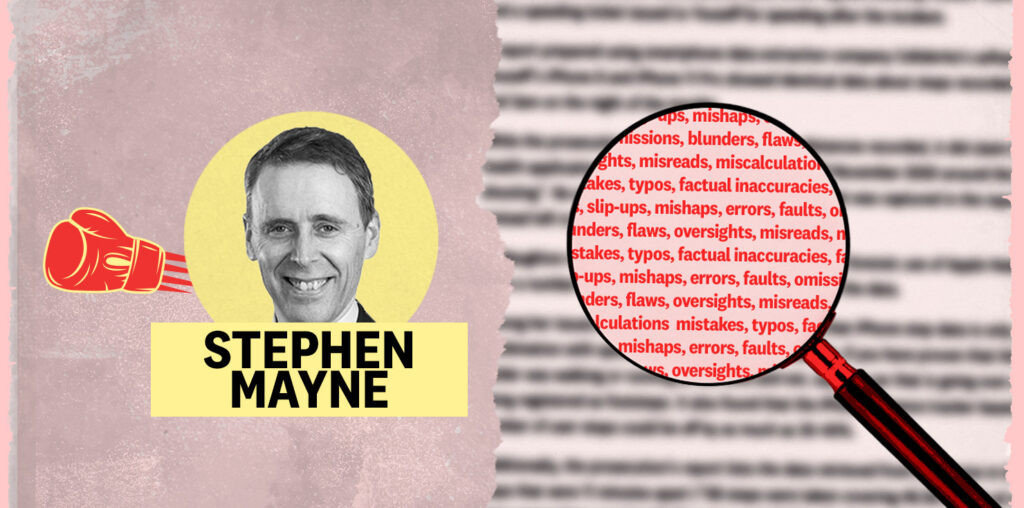Journalists are just like you — humans who make mistakes. At a time when they’re under increasing pressure, should reporters be writing about each other’s mistakes? That’s the question our debaters are tossing around in today’s Friday Fight.
In the affirmative corner we have Crikey editor Gina Rushton, and making the negative case is shareholder activist and Crikey founder Stephen Mayne.
As a long-time highlighter of journalistic misdemeanours, agreeing to a request from the Crikey bunker to back up this October 4 tweet, and take on the “no” case to the Friday Fight question of whether journalists should highlight each other’s mistakes was always going to be fraught, from a hypocrisy point of view.
But things are very different in 2024, so here goes.
First up, if you love and believe in the noble cause of journalism as a profession — leaving aside the questionable historical ethics of many media owners over the years (as Eric Beecher chronicled in his recent book, The Men Who Killed The News), why would you encourage members of that profession to endlessly bag each other publicly?
Do doctors highlight the mistakes of other doctors? Do teachers point to the flaws of colleagues at other schools? Do AFL or NRL stars post videos of their opponents’ errors on Instagram? Is it any wonder that trust in journalists is still down with used car sales staff given the way we constantly attack each other? In 2024, there are more than enough keyboard warriors on social media attacking the quality of our journalists without professional journalists joining the pile-on.
As an industry, we’re now globally burdened with the “fake news” moniker developed over eight years of Trumpism, which has led to violent attacks against individual journalists and media companies. Someone needs to stand up for good journalism. If professional journalists aren’t even prepared to praise or follow up the good work of their competitors, why even mention their mistakes? Just focus on your own job, for goodness sake!
Another reason to discourage excessive reporting of errors is that it will only disincentivise future admissions of mistakes, a common complaint against the media. If it becomes routine to admit and correct errors as soon as they’re discovered — which is best practice and can be seen in this Washington Post tweet admitting an error about who was the queen’s eldest grandchild — then more journalists will do it and the public record will become more accurate.
There were plenty of readers on Twitter who offered up comments about The Post’s error. Leave it to them. Nothing would have been served by The New York Times allocating scarce journalistic space and resources to a self-serving “how embarrassing for our competitor” story.
There is a global crisis when it comes to the resourcing of professional journalism, with news deserts popping up all over the place. Why would those journalists still eking out a living in the profession focus on highlighting the flaws of under-pressure colleagues battling the 24-hour news cycle and hostility from multiple quarters? Who’s got time to do that? There are bigger fish to fry!
With Google, Facebook and the likes of Seek, REA and CAR Group now monopolising the advertising revenues that used to fund most of our commercial journalism, the challenge now is persuading alternative philanthropic and government funders to step into the breach and directly support public interest journalism.
In this challenging environment, as a profession, we need to put our best foot forward — not have Four Corners deliver a 45-minute hit on the allegedly toxic culture at Channel Seven’s news division, or Seven’s Spotlight program respond with a one-hour attack on Four Corners after it lost a defamation case brought by former SAS soldier Heston Russell. Who wins from this? The public will just think, “They all deserve to die.”
By all means cover material journalist blunders or malfeasance, whether it be illegal phone-hacking, cash-for-comment schemes or propagating stolen election lies. Genuine scoops about competitors should also get a run.
But do The Australian and Guardian Australia’s weekly media columns really need to have so many tit-for-tat attacks that rarely cover their own flaws, particularly on the Murdoch side? I’m going to track both of these columns here going forward to see if there can be even a modest tilt to the positive. For straight-out gotchas about dodgy journalism, the ABC’s Media Watch is the only program that should do it week in, week out, as that is its mandate.
In order to achieve this cultural change, a couple of key things need to happen. Firstly, after more than a century of Murdoch family hostility towards public sector broadcasters, News Corp should call off its obsessive holy war against the ABC. Readers and viewers aren’t particularly interested in petty industry point-scoring, but rarely does a night go by on Sky after dark where the ABC isn’t gratuitously attacked. Call off the dogs, Lachlan, the recent three-part Australian Story on you by Paddy Manning was genuinely fair, balanced and interesting!
If there is to be a future James Murdoch coup at News Corp and Fox Corp after Rupert’s passing, his first speech as the new chair—
DING DING DING. CRIKEY EDITORS WARN THAT STEPHEN MAYNE IS NOW OVER THE 800-WORD LIMIT.
—should include the line: “We’re proud purveyors of professional journalism and want to see our industry thrive, no matter whether it’s funded by us, the ABC, The Age or The Guardian. Our family’s 100-year war against public broadcasters is over and I look forward to being interviewed by Sarah Ferguson on 7.30.”
But don’t hold your breath. As one retired media owner told me recently: “The Murdochs always attack their competitors, that’s just how they are.”
And that just leads to endless revenge attacks on the Murdochs, which leaves no winners. It’s time for a media industry détente. Give peace a chance and stop all these unnecessary attacks!
Read the opposing argument by Gina Rushton.

